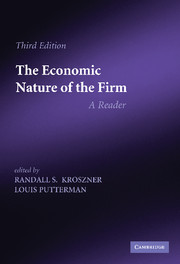Book contents
- Frontmatter
- Contents
- Editors' preface
- Reintroducing The Economic Nature of the Firm
- Part I Within and among firms: the division of labor
- Part II The scope of the firm
- Part III The employment relation, the human factor, and internal organization
- Part IV Finance and the control of the firm
- 19 Mergers and the market for corporate control
- 20 Agency problems and the theory of the firm
- 21 Theory of the firm: managerial behavior, agency costs, and ownership structure
- 22 Organizational forms and investment decisions
- 23 The rise in managerial stock ownership
- 24 Executive compensation as an agency problem
- 25 An economist's perspective on the theory of the firm
- 26 Ownership and the nature of the firm
- References
- References
19 - Mergers and the market for corporate control
Published online by Cambridge University Press: 05 June 2014
- Frontmatter
- Contents
- Editors' preface
- Reintroducing The Economic Nature of the Firm
- Part I Within and among firms: the division of labor
- Part II The scope of the firm
- Part III The employment relation, the human factor, and internal organization
- Part IV Finance and the control of the firm
- 19 Mergers and the market for corporate control
- 20 Agency problems and the theory of the firm
- 21 Theory of the firm: managerial behavior, agency costs, and ownership structure
- 22 Organizational forms and investment decisions
- 23 The rise in managerial stock ownership
- 24 Executive compensation as an agency problem
- 25 An economist's perspective on the theory of the firm
- 26 Ownership and the nature of the firm
- References
- References
Summary
The corporate-control market
The conventional approach to a merger problem takes corporations merely as decision-making units or firms within the classical market framework. This approach dictates a ban on many horizontal mergers almost by definition. The basic proposition advanced in this paper is that the control of corporations may constitute a valuable asset, that this asset exists independent of any interest in either economies of scale or monopoly profits, that an active market for corporate control exists, and that a great many mergers are probably the result of the successful workings of this special market.
Basically this paper will constitute an introduction to a study of the market for corporation control. The emphasis will be placed on the antitrust implications of this market, but the analysis to follow has important implications for a variety of economic questions. Perhaps the most important implications are those for the alleged separation of ownership and control in large corporations. So long as we are unable to discern any control relationship between small shareholders and corporate management, the thrust of Berle and Means's famous phrase remains strong. But, as will be explained below, the market for corporate control gives to these shareholders both power and protection commensurate with their interest in corporate affairs.
A fundamental premise underlying the market for corporate control is the existence of a high positive correlation between corporate managerial efficiency and the market price of shares of that company.
- Type
- Chapter
- Information
- The Economic Nature of the FirmA Reader, pp. 267 - 269Publisher: Cambridge University PressPrint publication year: 2009



